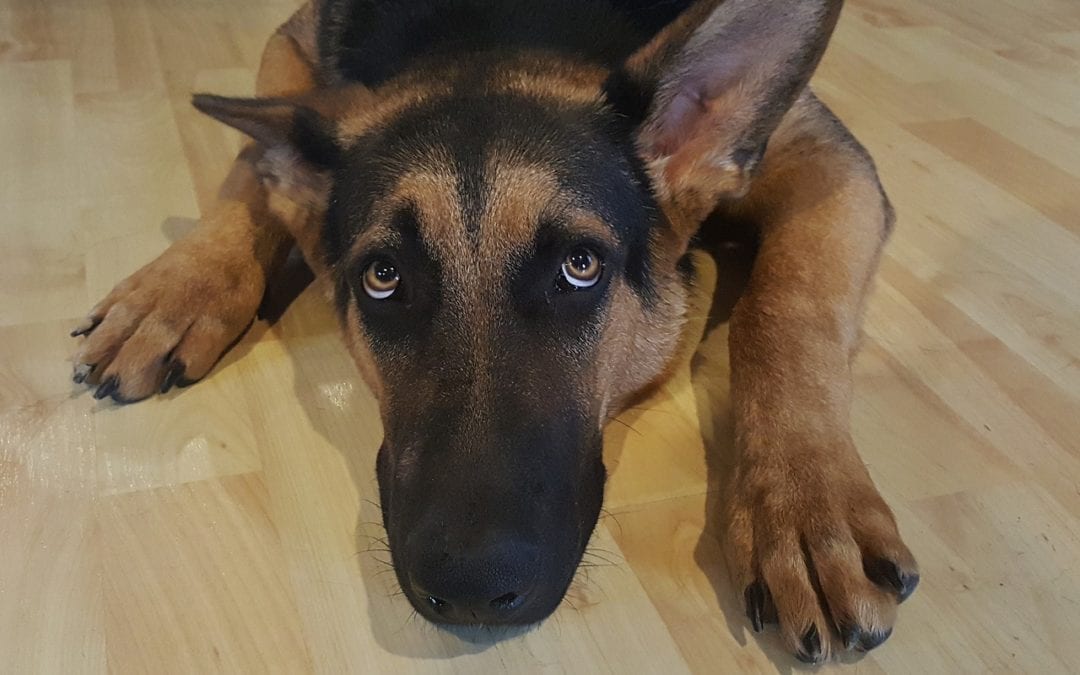It can be a frightening time when your beloved pet, who has never been sick a day in his/her life, starts vomiting. “Why is this happening?”, you might ask. “What can I do to stop this?” Most people feel confused and helpless when their pet vomits. Fortunately, there are ways to be proactive in helping your pet get back to their normal self.
First, there is much to consider regarding the timing of the vomiting. Has your pet vomited 10 times over the course of 24 hours? Or has he/she vomited once a week for several months? Acute vomiting is a more emergent problem than chronic, intermittent vomiting over a long period of time. If your dog has vomited multiple times over the course of a day or two, bring them in for an exam by your veterinarian immediately. Think back. Is your pet a young dog who likes to eat rocks or rip the stuffing out of their toys? A foreign body may be stuck inside your dog’s gastrointestinal tract, causing an obstruction. This is a surgical emergency. Your veterinarian will recommend abdominal exploratory surgery, in which the surgeon searches the entire GI tract to find and remove the object. Alternatively, has your dog recently eaten a fatty steak or stick of butter? Dietary indiscretion, especially of a fatty meal, can lead to pancreatitis (inflammation of the pancreas) which usually requires hospitalization on IV fluids and intensive medical care to treat. Your veterinarian will perform diagnostic tests (usually bloodwork and abdominal x-rays) to sort out these possible diseases, among others.
Chronic, intermittent vomiting is not an emergency, but it can be more difficult to obtain a diagnosis. A whole host of diseases can cause chronic vomiting, from kidney disease to diabetes to cancer to food allergies. Your veterinarian will want to know a lot of historical information. Does your pet vomit when fed some foods but not others? Can you detect a sweet smell on your pet’s breath? Is the vomiting accompanied by increased thirst and urination? Your veterinarian will take these details into consideration when forming a diagnostic plan. Kidney disease can be easily found on routine bloodwork, and may require a simple diet change or IV fluids, depending on the severity. Hyperthyroidism, common in cats and also easily detected, requires a simple twice-daily medication to treat. On the other hand, in an older animal, cancer can cause vomiting and is often not easily found on bloodwork or even x-rays. Sometimes, we need to refer your pet for an abdominal ultrasound, which will pick up subtle, small abnormalities in the abdomen. The bottom line with chronic vomiting is that it can take time and sometimes an extensive workup to get to the root of the problem.
What does the vomitous look like? Your veterinarian will want to know this as well. Is it a big pile of undigested food? This may indicate an obstruction, especially if it occurs within 30 minutes – 2 hours of eating a meal. Is there bright red blood in it? This may be indicative of a disease called hemorrhagic gastroenteritis, or HGE, which usually requires hospitalization on IV fluids and is treated similarly to pancreatitis. Or does the vomitous look like black coffee grounds? This means that there is an ulcer somewhere in the small intestines and your pet would benefit from an antacid.
So what can you do to help your pet until your appointment? First of all, don’t panic. Most causes of vomiting can be treated either medically or surgically by your veterinarian. If your pet is acutely vomiting and can’t keep anything down, take away their food and water. Protracted vomiting can lead to even more irritation of the GI tract. For chronic vomiters, you may try feeding a bland diet, such as boiled chicken and rice. An antacid, such as Pepcid AC, as well as a probiotic would not hurt either. Call your veterinarian to determine an appropriate dose for your pet. If your pet is vomiting first thing in the morning on an empty stomach, try giving him/her a late-night snack before bedtime. These are all safe, easy tricks to start with. Ultimately, once examined by your veterinarian, a personalized plan will be put in place to get your pet feeling better in no time.


